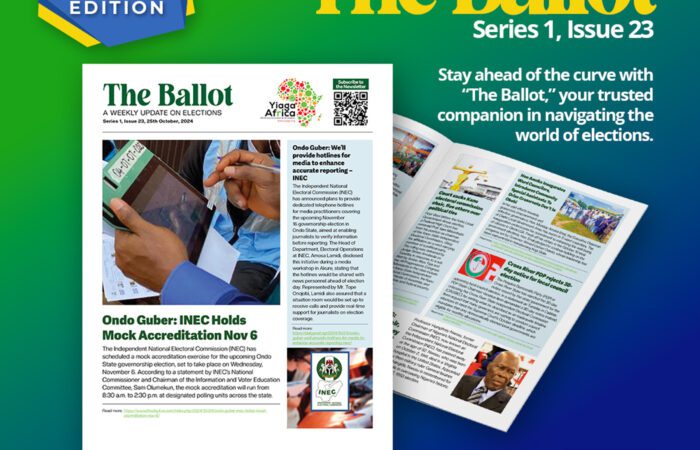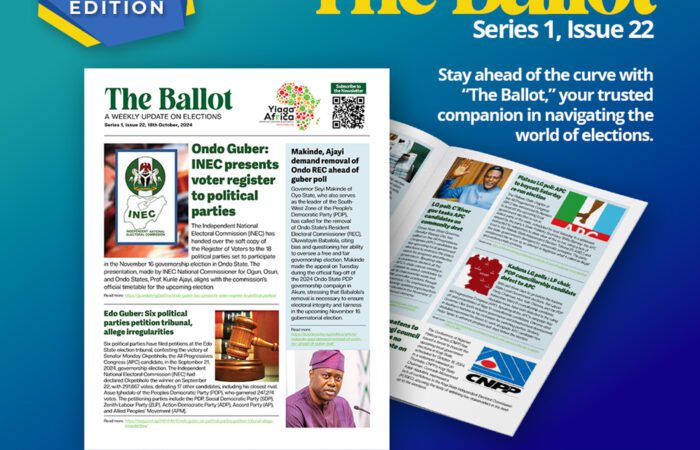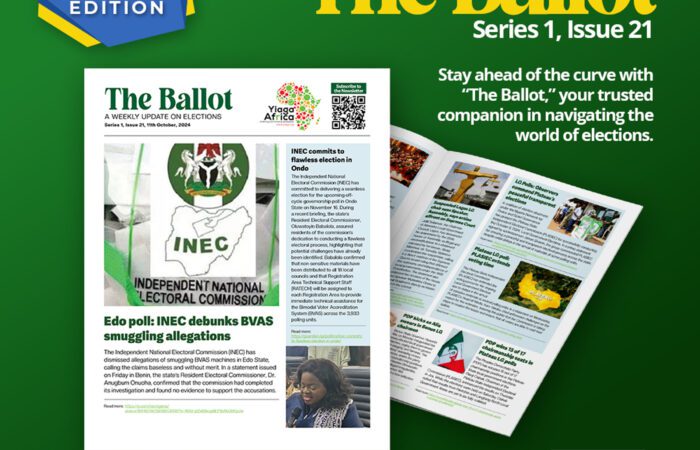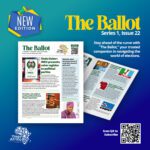Introduction
Ladies and Gentlemen, distinguished guests – welcome to the YIAGA AFRICA Watching The Vote (WTV) public presentation of the 2019 general election report holding today, August 30th, 2019 at the Transcorp Hilton In Abuja.
Nigeria’s 20 years democracy was tested with the conduct of the 2019 general elections. The elections presented an opportunity for Nigeria to consolidate on the gains of the 2015 elections and deepen her democratic transition. Although INEC introduced reforms to deepen electoral integrity and citizens participation, the elections were characterized by many of the same shortcomings that have marred previous national elections in Nigeria. As in past elections, INEC’s logistical challenges and misconduct by political parties undermined the integrity of the elections and the ability of some citizens to vote and undermined public confidence in the process. Clearly, INEC overestimated its own capabilities and/or underrated the challenges with the management of logistics. This was worsened by undue interference with the electoral commission functions by state and non-state actors as well as release of election funds six weeks to the presidential elections despite its secured funding from the Consolidated Revenue Fund (CRF). The assault on basic rights and freedoms by state institutions especially security agencies coupled with failure to conclude amendments to the electoral legal framework indicated a lack of commitment to electoral reform and electoral integrity.
For the 2019 presidential elections, the official results announced by INEC were consistent with YIAGA AFRICA’s Parallel Vote Tabulation results estimates. In other words, the results reflect the votes cast at the polling units. Similarly, the INEC official turnout rate and rejected ballots figure were consistent with YIAGA AFRICA estimated turn out rate and rejected ballots based on reports from 1,491 (98.4%) of sampled polling units. However, the YIAGA AFRICA PVT findings revealed certain lapses and reports of malfeasance which impacted on the quality of the process in some polling units and states. The PVT also revealed possible incidents of vote suppression as reflected in the percentage of cancelled ballots in some states like Rivers, Nassarawa, Akwa Ibom, Cross River, Plateau, Kogi, Benue and Kaduna states. It is important to note that YIAGA AFRICA’s PVT estimates are based on the results from polling units before elections were cancelled. Therefore, the PVT estimates would expose whether cancellation of ballots would have impacted the outcome of the presidential election. Although these cancellations did not affect the overall outcome of the election but it led to the disenfranchisement of voters and exposed complicity on the part of election officials. However, unless the misconduct and malfeasance occurred in a statistically significant number of polling units across the states the PVT would have captured them as critical incidents which undermined the outcome. The report contains evidence which make makes it clear that a lot was less than desired, and that the overall outcome (however valid) is not necessarily vindication of the process.
Nigeria missed an opportunity to improve the quality of its elections as compared to the 2015 national elections. The 2019 elections were not the elections Nigerians wanted; they were not the elections Nigerians expected; and, most importantly, they were not the elections Nigerians deserved. Nigeria needs a national conversation on a new electoral design or framework that responds to prevailing socio-political and economic realities. INEC must improve its capacity to deliver credible elections and political parties must play according to the rules. Failure to do so could imperil Nigeria’s 20 years democracy.
Issues in the 2019 General Elections
Election Management
Electoral leadership is essential for successful elections. Elections in Nigeria fail to meet standards or inspire confidence because of poor performance attributed to lack of effective planning. When election officials are not appointed in due time, when procurement processes are delayed, when ad-hoc officials are not recruited and trained early, elections will fail. Until December 7, 2018, INEC had only 50% of its leadership full constituted. 33 states of the federation had no Resident Electoral Commissioners Twenty-three months to the 2019 elections. It took over 1 year and 6 months for President Buhari to fully appoint National commissioners to the electoral commission. The delay in constituting the commission gravely impacted election planning and implementation.
Several reforms and innovations were introduced by INEC to promote electoral integrity and citizens participation. These reforms include a 16-month Continuous Voter Registration (CVR) and PVC collection exercise, simultaneous accreditation and voting, electronic transmission of results, tactile ballots and braille guide for persons with disability, re-configuration of the polling units to guarantee secrecy of the ballot, scenarios and response for the application of the Margin of Lead principle and sustained stakeholder engagement amongst others. The commission undertook robust voter education in partnership with other stakeholders like National Orientation Agency and civil society groups.
Few hours to the commencement of polls on February 16, 2019, INEC announced the postponement of the presidential and national assembly elections to February 23 and governorship and state assembly elections from March 2, 2019 to March 9, 2019 citing challenges with election logistics deployment especially deployment of sensitive election materials (ballot papers and results sheets). YIAGA AFRICA believes the decision to postpone the elections was taken in the interest of Nigeria’s democracy. Clearly, INEC overestimated its own capabilities and/or underrated the challenges with the management of logistics. The Nigerian citizenry deserve commendation for their patriotism and resilience to participate in the elections despite the postponement of elections. YIAGA AFRICA commends INEC for sharing information with stakeholders through the daily briefing by the INEC Chairman. It availed citizens with adequate information on INEC’s preparedness and boosted confidence in electoral stakeholders.
Despite the one-week delay, INEC continued to experience significant logistical challenges on 23 February that resulted in late opening of polling units throughout the country. As at 7:30 am on February 23, YIAGA AFRICA WTV observers reported that INEC Officials had arrived at 31% of polling units. As of 10:00 am, 41% of polling units had opened across the country. By 11:30 am, 74% of polling units had opened nationally. As was the case in 2011 and 2015, polling units in the South East and South-South opened later than in other geopolitical zones. At 11:30 am, YIAGA AFRICA WTV observers reported that 74% of polling units had opened as of 11:30 am.
Once polling units opened, most polling units had essential election materials including a register of voters, indelible ink/ a marker pen, an official stamp, voting cubicle, ink pad, presidential ballot box and polling unit booklet. Smart Card Readers were present in 99% of polling units and were largely used throughout accreditation and voting. However, nearly half of voters may have voted with the Smart Card Reader authenticating only their Permanent Voters Card and not their fingerprints.
- Unclear electoral rules, weak oversight
INEC’s issued guidelines to improve the integrity of the electoral process and inspire confidence in electoral stakeholders. For instance, INEC insisted on the use of Smart Card Reader for voter accreditation eliminate multiple voting and voting by proxy. The Commission also insisted on the display of polling unit results using the Form EC 60 E (The People’s Results sheet). YIAGA AFRICA noted some lapses in the design, communication and lack of uniformity in the implementation of the guidelines issued by the electoral commission. There was no clarity on who reserves the authority to cancel ballots and the levels where cancellation will take place. In 97% of sampled polling units in the Presidential elections, no individual was permitted to vote if their names did not appear on the register of voters while in 7% of polling units the Smart Card Readers was not used throughout for the accreditation of voters. Of most concern was the failure to publicly post the presidential election results at the end of counting in 19% of polling units.
- Election Results management
Election results management remains the weakest link in Nigeria’s electoral process. This necessitated the introduction of the electronic transmission of results by INEC to reduce incidence of results mutilation and falsification. INEC has been piloting the system with the off-cycle elections to test its efficiency and reliability. For the presidential elections, YIAGA AFRICA WTV findings indicate that INEC Presiding Officers electronically transmitted the Presidential election results using the Smart Card Reader in 65% of polling units. Collation officers exercised excessive discretionary powers in cancelling results and declared winners where the total number of registered voters in cancelled polling units will affect the margin of lead between candidates in flagrant violation of Section 26 and 53 of the 2010 Electoral Act as amended. Overall, the percentage of cancelled ballots announced by INEC was 3.3% of all registered voters. This is four times higher than the rate from 2015 when registered voters in cancelled polling units was less than 1% of all registered votes. INEC to undertake a public investigation into the cancelation of ballots and to take appropriate legal actions should it be discovered that any INEC staff or collation officer cancelled ballots with intent to affect the election outcome.
YIAGA AFRICA a noted discrepancy between registered voters as announced before the election and during Collation. Prior to 23 February 2019, INEC announced a total a number of 84,004,084 registered voters. During the national collation for the Presidential elections, 82,344,125 registered voters was declared indicating a difference of 1,659,959. YIAGA AFRICA WTV observers reported the number of registered voters at sampled polling units and those were overwhelmingly consistent with the polling unit level registration figures provided by INEC on the register with 84,004,084 registrants. Thus, while INEC should provide an explanation for this discrepancy, PVT data shows that the correct register was used at polling units and hence this difference did not affect the election outcome.
- Inadequate strategic communications and poor access to information
INEC still grapples with effective public communication and information sharing. Whilst noting significant improvement in the Commission’s use of traditional and digital media for public outreach, the frequency, timeliness and availability of election information and data has been poor. In voting centers where election did not hold or it was postponed, INEC failed to clearly communicate procedures for a second day of voting.
Undemocratic political party primaries and commercialized candidate nomination process
According to the INEC election timetable, parties were expected to conduct party primaries between 18th August and 7th October 2018 in order to submit the candidates list on the 18th of October for Presidential and National Assembly election and the 2nd of November for the Governorship and State Assembly election 2019. Recognizing the important role of party primaries in our democracy, YIAGA AFRICA Watching the Vote observed the conduct of party primaries to nominate candidates for the Presidential elections. YIAGA AFRICA employed direct observation of the party primaries, interviews and desk review of reports for the observation of party primaries.
Political parties deliberately flouted their guidelines, constitutions, INEC Guidelines on Party Primaries as well as the Electoral Act. The party primaries were signposted by financial inducement and horse-trading. WTV observers reported inducement of delegates with local and foreign currencies during direct and indirect primaries. WTV observed deliberate substitution of candidates who won in primaries with supposed “anointed choices” of party leaders. This runs contrary to the provisions of the electoral act and recent judicial decisions on nomination of candidates. Most parties failed to submit the list of delegates to INEC prior to the conduct of primary elections. Others conducted parallel primaries in contravention of laid down rules. This led to violence and disruption especially in Benue, Delta, Zamfara and Imo states. YIAGA AFRICA made four projections in the preliminary report on the conduct of party primaries. They include;
- An upsurge in pre-election disputes filed in court
- Heighten rate of vote buying and selling during elections
- Low level of women, youth and PWD candidates for the elections
- High incidence of political violence driven by intra and inter party conflicts
As projected in our preliminary report, a total of 809 court cases were filed challenging the conduct of primaries by political parties. This figure is higher than the 766 election petitions cases on the 2019 elections. Women, PWD and youth candidacy was also unimpressive. For the presidential elections, women candidacy stood at 8.3%; Senate 12.3%; House of Representatives 11.6%. Of the 23, 316 candidates fielded by parties for the general elections, only 7,772 were youths (18 – 35). Purchase of Permanent Voter Card and Voter Identification Numbers (VIN) were amongst the new methods devised by politicians for vote buying. Violence also marred the elections in several polling units resulting to votes cancellation and inconclusive elections.
Election Security
In the build-up to the election, YIAGA AFRICA and Nigerians received assurances from security agencies on their non-partisanship and professionalism in the management of election security operations. INEC also informed stakeholders of assurances from security agencies to collaborate and ensure effective deployment for the elections. Despite these assurances, there were reported cases of violence leading to loss of lives and property in pre-election period and election day. In some cases, security agencies especially officers of the Nigeria army disrupted elections in some polling units and restricted the movement of election observers on election day contrary to the provision of Section 29 of the 2015 Electoral Amendment Act which limits the role of the military to the provision of security support for deployment and safety of election materials and personnel. These incidents were mainly reported in Akwa Ibom, Rivers and Bayelsa states. A YIAGA AFRICA WTV observer was also arrested and detained in Kafanchan, Kaduna state during the Presidential elections.
Declining Voter turnout
YIAGA AFRICA’s PVT estimates indicated that turnout for the national presidential election will be less than the voter turnout rate for the 2015 Presidential elections based on official turnout figures collected from the PVT’s representative statistical sample of polling units across the 774 LGAs and 36 states plus the FCT. INEC’s official turnout rate of 35% indicates a decline in voter turnout. This reflects a growing sense of disconnect between the Nigerian people and the political elite. It also raises questions on the credibility of Nigeria’s voter registration figures.
Assault on basic rights and freedoms especially press freedom and civil society
YIAGA AFRICA notes a budding trend of voter intimidation and assault against unsuspecting individuals, press and civil society during elections. Voters were intimidated, harassed or assaulted in 9% of polling units during accreditation and voting. INEC polling officials were also intimidated, harassed or assaulted in 7% of polling units during accreditation and voting. In 11% of polling units, political party agents attempted to influence voters or INEC officials. YIAGA AFRICA received verified critical incidents reports of APC and PDP agents or supporters attacking observers, polling staff or voters; snatching ballot boxes; and destroying election materials. These incidents though isolated – are examples of egregious misconduct that undermine the electoral process. If Nigerian democracy is to move forward, party leaders must ensure that they encourage and model peaceful engagement with the electoral process and urge their supporters to act in accordance with the electoral guidelines and the law.
Recommendations
Following the comprehensive observation of the 2019 electoral cycle, YIAGA AFRICA makes the following recommendations;
Election Management
- YIAGA AFRICA urges INEC to undertake a comprehensive post-election review of the 2019 electoral timeline to identify gaps in its preparations and to clearly communicate with the public plans to address the structural or other issues that have resulted in three successive national elections marred by logistics challenges. The challenges experienced during the elections calls for a detailed and systematic post-election review which includes an inquiry into the cancellation of ballots, an audit of the voter register and a review of the elections operation management systems.
- INEC should imbibe a culture of proactive disclosure of election information in line with standard open election data principles to facilitate public engagement and boost stakeholder confidence in the electoral process. Election results, voter registration data, PVC collection rates electoral guidelines etc. should be easily be made public via traditional and digital platforms.
- YIAGA AFRICA also recommends that INEC review its training procedures for ad hoc polling staff in view of failures to consistently adhere to counting procedures such as counting the number of unused ballot papers, counting the number of spoilt presidential ballot papers, counting the number of counterfoils for the presidential ballot papers and sorting the presidential ballot papers into piles with a pile for each party and another pile for rejected ballots.
- INEC should review its policy of deploying academics as collation or returning officers. Experience has shown that academics are also susceptible to compromise and the accountability mechanism is weak. To this end, INEC should diversify the composition of collation and returning officers to include individuals and professional organizations with impeccable character and stout mechanisms of accountability.
- Investigate and discipline all permanent and ad-hoc staff alleged to have been involved in any malpractice or fraud during and after the elections. INEC should provide regular public updates on the prosecution of its staff involve in electoral malfeasance.
Electoral Legal Framework
- The 2019 elections revealed challenges in the electoral process which calls for a review of the Legal framework for Elections which includes further review of the electoral guidelines regulating the cancellation of votes at polling units.
- The 9th National Assembly should prioritize constitutional and electoral reform in its legislative agenda. Special attention should be placed on reviewing the timelines for submission of list of candidates and substitution of candidates from 45 days to 60 days; introduce time frame for the appointment of INEC Chairman, National Commissioners and Resident Electoral Commissioners; harmonize timelines for the determination of pre-election matters and duality of jurisdiction and amend Section 68 of the electoral act to regulate the power of polling officials to declare results.
- To cut election cost and reduce election logistics hiccups, INEC and the National Assembly should engage with electoral stakeholders to introduce new criteria for access to the ballot vis-a-vis tightening the criteria for registration of new political parties as well as review the sequence of elections to enable INEC conduct elections in one day.
Political parties
- YIAGA AFRICA calls on parties to deepen internal party democracy through the organization of more transparent and open primaries and to make active efforts to attract and promote candidates with capacity, competence and character in electoral contests. Candidates should emerge through an open and competitive process rather than an auction to the highest bidder.
- Parties should develop protocols for recruitment, training, and deployment of party agents for elections. This will enhance the quality of their engagement during elections.
- Political parties should demonstrate commitment to electoral integrity and accountability by sanctioning its members involved in electoral fraud or violence during the 2019 elections.
Security agencies
- Security agencies should as a matter of urgency commence investigation and prosecution of electoral offenders especially for the violent disruption of the electoral process which led to the death of some citizens.
- YIAGA AFRICA calls on the security agencies to ensure proper coordination especially between the military and police during elections. It is important to note that the Police is the lead security agency responsible for election security, such proper lines of communication and rules of engagement should be adhered to. Security agencies must at all cost remain non-partisan and professional in their conduct and operation.
Civil society and media
- CSOs and media should expand the scope of their electoral engagement to the entire spectrum of the electoral process
- CSOs should work in a collaborative manner to set the agenda on electoral reform and mobilize citizens to provide oversight on the electoral reform process
- CSOs and media should intensify engagement with INEC and other stakeholders to address the shortcomings in the 2019 elections and improve the quality of elections in Nigeria.
International Community and development partners
- Impose sanctions on individuals and institutions who undermine Nigeria’s democracy and instigate electoral violence. YIAGA AFRICA commends the United States for the imposition of visa ban on persons who undermined the 2019 elections. YIAGA AFRICA calls on the United States government to make public the list of individuals on the visa ban as this will enhance accountability and promote deterrence. Other foreign missions should adopt this mechanism of accountability and make public the list of individuals placed on ban.
- Sustain support for democratic reforms in Nigeria through timely and strategic advocacy and support to civil society.
- Hold the Nigerian government accountable to her commitment to international norms and standards like human rights, rule of law and constitutionalism.
Thank you and God Bless the people of Nigeria!
For media inquiries please contact:
Moshood Isah
Communication OfficerYIAGA AFRICATel. +234 (0) 703 666 9339
Email: misah@yiaga.org
Learn more about #WatchingTheVote at www.watchingthevote.org or on social media on Facebook at facebook.com/yiaga.org, Twitter @YIAGA.






